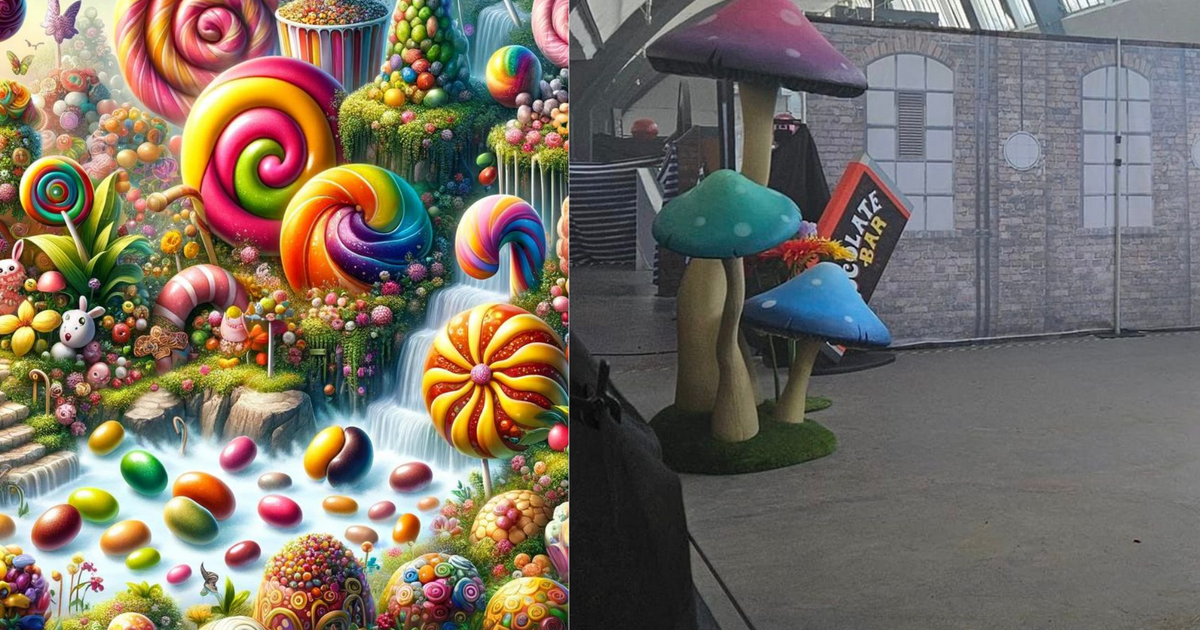AI Generated event proves that artificial intelligence won’t entirely be coming for our jobs anytime soon…
In the not-so-Fictional Chocolate World of Willy Wonka, reality is often suspended in favor of pure imagination. The iconic character concocted by the whimsical prose of Roald Dahl and later brewed into larger-than-life cinematic spectacle, instilled in many of us children of all ages the belief in the extraordinary power of fancy. Yet, in a chilling twist of irony, a recent “Willy’s Chocolate Experience” support the testament that not every venture inspired by the legacy of one of literature’s greatest imaginers, ends on a note of delight.
The Chocolate Factory That Never Was
Despite the festive hues of marketing material, promising rivers of chocolate and delicious sweets, an event occurred that Warner Bros., the orchestrator of the Willy Wonka cinematic universe, was unaware of. “Willy’s Chocolate Experience” enticed fans and newcomers alike to part with their hard-earned dollars in return for an exquisite journey into the world of candy fantasy. However, as the faithful flocked in great numbers, optimism sweetening the air, the smell of reality unfolding had a much sourer smell.
It turns out that the chocolate factory they were looking for was nothing more than a fiction, a gloomy warehouse decorated with fake props that would have deceived poor Charlie. Customers discovered a low-quality landscape lacking of the promised marvels and marvelous creations. The event organizers, armed with the increasingly typical excuse of last-minute failures, tried to save face. However, the harm was done, and perhaps a little too much acid curdled in the melting pot of their catastrophe.
A Whirlwind of Disappointment and Despair
The nightmare real-life rendition unfolded like a script ripped reluctantly from the pages of a Dahl novel. Glasgow served as the backdrop, with its residents acting as unintentional extras in a scene that would make even the most resilient Oompa-Loompas cry. The police, who monitor Scottish festivals, were asked to observe what turned out to be a bizarre meltdown. Parents and their children left with more than a Whipple-Scrumptious Fudgemallow Delight, including tears and a bitter aftertaste.
The photos that spread sadly over social media were less snapshots and more snapshot judgments of an endeavor gone wrong, a paradise lost. It was a political cartoon that politics would not dare to deliver: a striking contrast between the guarantees made and the broken remains of a shattered promise. For on that day, the misplaced golden ticket did not offer a factory tour, but instead took patrons on a tour-de-force of the Theatre of the Absurd.



The AI-Gone-Wrong Catastrophe
A modern twist on the misguided steps of technological innovation also found a role in this unglamorous unwrapping. The story had overtones of the infamous ‘Fyre Fest’, which was an obituary for 21st-century cultural mistakes. This time, however, artificial intelligence served the community by discouraging the trusting public from succumbing to the temptation of digital dreams.
The AI-generated blunderbuss was particularly disturbing because it invoked pictures of tickets that, in digital context, would fit perfectly on an Instagram post—or fuel for the appropriate tweet of dissonance. The guy playing Willy Wonka at the event appeared to deliver the punchline that no one wanted to hear. Instead of a beautifully familiar narrative, the poor fellow received a fifteen-page feast of AI-generated gebberish. The chocolate rivers had dried up, and it appeared that the words would follow suit.
In Defense of the Fantasy
One might argue that the collapse of an event aiming to honor the whimsy of Willy Wonka is itself a poetic homage to the cautionary tale the character represents. The promise of indulgent fantasy, when sold on a silver wrapper, often holds a thin concealed disappointment. After all, the misguided integrity of entering into such creative realms without the permission of the intellectual property’s custodians may be just the right amount of realism in the overpowering recipe of adaptation.
The ‘Willy’s Chocolate Experience’ serves as a poignant parable that reminds us all of the delicate balance between thrill and disappointment, expectation and reality, wonder and the harsh light of day. It is this same duality that defined not only Willy Wonka but our longing for enchantment. It prompts us to remember that the shadow of our dreams, stretched wide in the noonday sun, makes for a fascinating spectacle, but it is ultimately the essence of a reliable dreamland that we, as collective dreamers, eternally seek.
Conclusion: A Legacy Unscathed
Willy Wonka and his chocolate legacy meanwhile remain, as they should, untarnished by the missteps of mere mortals. Dahl’s timeless metaphor, regardless of culinary context, appeals to a universal truth born out of the event’s flaws. It is a truth that celebrates the unusual, inventive, and wild—as long as these characteristics are somehow linked to the foundation of sincerity and excellence.
The Fyre Festival and ‘Willy’s Chocolate Experience’ now sit on the same mantelpiece, collectibles of an era where the line between dream and nightmare—between what is promised and what is presented—blurs with eerie regularity. They stand testament to the invincible human spirit’s capacity for belief and the dissonance between imagination and its interpretation.
In the end, the golden ticket need not be tangible or physical. True riches, it seems, are those wished for with a heart half heavy and half soaring—the expectation of a glorious experience traded for the comforting traik of a reality without surprise or intrigue. And perhaps that, in its own way, is the greatest gift that this most cynical of chocolate misadventures has unwrapped for us.






